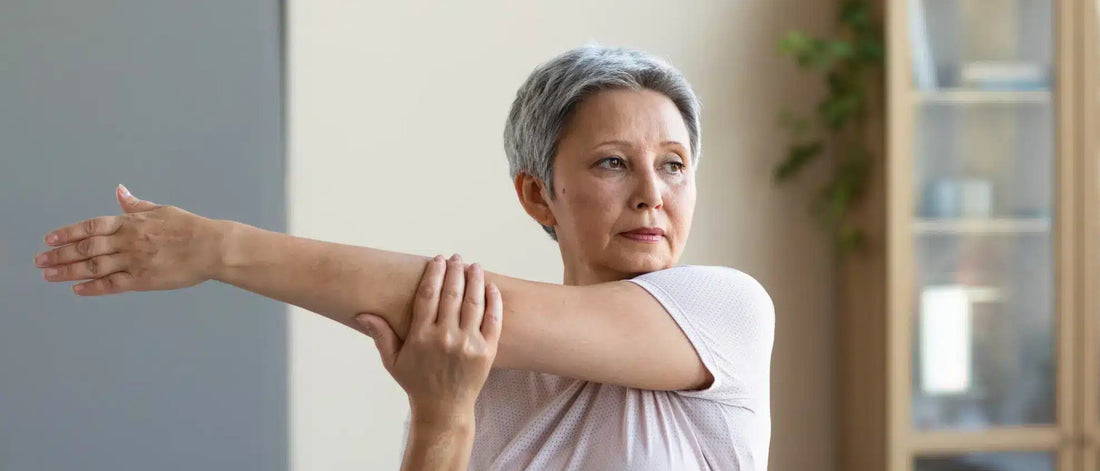
How to Navigate Menopause and Perimenopause Naturally: Real Relief for Hot Flashes, Mood Swings & Joint Pain
Share
You’re in your 40s. You wake up in the middle of the night, soaked in sweat. Your periods are suddenly unpredictable-heavier, lighter, or skipped altogether. Your mood changes without warning, and you’re not sure why.
It’s real. It’s common. And you’re not alone.
These hormonal transitions are what we call perimenopause and menopause. In this blog, we’ll break down what exactly is happening inside your body, why these changes occur, the most common symptoms to watch for, and science-backed, natural ways to find relief- so you can feel informed, supported, and back in sync with yourself.
What Is Perimenopause and Menopause?
Perimenopause is your body’s natural transition into menopause, a hormonal shift that typically begins in your 40s (sometimes earlier). During this phase, estrogen and progesterone levels fluctuate, triggering changes like:
-
Irregular periods
-
Hot flashes and night sweats
-
Mood shifts
-
Joint pain or stiffness
This phase usually lasts 4–6 years, though it can range from a few months to nearly a decade.
Menopause marks the official end of the reproductive phase. It’s diagnosed when you’ve gone 12 consecutive months without a period, usually between the age of 45 and 55. At this point, the ovaries have stopped releasing eggs, and estrogen levels are consistently low.
Reminder- While the symptoms can feel overwhelming at times, it’s important to remember:
This isn’t a disease, it’s a normal biological phase.
With the right knowledge, support, and daily care, it can absolutely be managed.
The Hormone Connection: The Real Story Behind All the Menopause Shifts
Understanding why your body feels different starts with what’s happening inside, especially with your hormones. Understanding this connection is the first step toward feeling like yourself again.
-
The Ovarian Shift
As we age, the ovaries gradually release fewer egg-containing follicles. This slows down the production of key female hormones: estrogen (regulates mood, skin, temperature) and progesterone (supports sleep and cycle balance).
➤ Result? Hormonal imbalance begins. -
The Brain Tries to Help
Your brain senses the hormone drop and sends out signals, mainly through a hormone called FSH (Follicle Stimulating Hormone) to push the ovaries to work harder. But aging ovaries become less responsive over time.
➤ This creates a disconnect between what your body needs and what it can produce. -
Low Estrogen = Symptoms
With consistently low levels of estrogen and progesterone, common symptoms kick in like hot flashes, mood swings, sleep issues and joint discomfort.
In short: Aging ovaries → Hormone drop → Brain signals → Ovaries don’t respond → Symptoms show up
“When symptoms like mood swings, hot flashes, or irregular periods feels confusing - we usually check hormone levels like FSH, estradiol, and AMH, along with a thyroid panel, to see if it’s perimenopause or something else.”
— Dr. Meera S., Women’s Health Specialist
Common Signs You’re in This Transition
Manageable Symptoms
-
Hot flashes
-
Night sweats
-
Mood swings
-
Anxiety or irritability
-
Sleep disturbances
-
Brain fog
-
Weight gain
-
Joint pain
-
Bloating
Gradual or Long-Term Changes
-
Irregular or absent periods
-
Vaginal dryness
-
Low libido
-
Hair thinning
-
Skin dryness
-
Loss of bone density
According to a study, nearly 70% of women experience noticeable symptoms during the menopausal transition.
Real Women, Real Patterns: What Menopause Actually Feels Like
“I thought I was losing my mind. I had heart palpitations, anxiety, and trouble sleeping, but I never connected it to perimenopause until my doctor explained it. I wish I’d known these could be hormonal changes. Shatavari supplement really helped me feel more balanced.” – Priya, 47
“The mood swings hit me out of nowhere. One minute I’d be fine, the next I’d be crying for no reason. I kept asking myself, ‘Is this stress, depression, or menopause?’ It was so confusing at first.” – Neha, 43
“I was struggling with strange symptoms, sleepless nights, sudden anger, joint pain. I searched online to understand what was happening and landed on BR Nutricure’s website. That’s when I realized it was perimenopause. I started using their Menopause Support, and honestly, from that day till now, life feels so much more peaceful and balanced.” – Seema, 45
“My joints started aching and I felt so tired all the time. I honestly thought I had arthritis. ” – Tanya, 51
"Alongside regular treatment, I often recommend natural ingredients like isoflavones for hot flashes, shatavari for hormonal balance, and glucosamine for joint support. These additions can make a real difference in managing menopausal symptoms."
–
Dr. Meera Sudan, Gynecologist
“I went online because I was so confused by my symptoms—brain fog, insomnia, and night sweats. Reading other women’s stories made me feel less alone and helped me finally recognize what was happening. ” – Poonam, 48
"These real stories show that menopause rarely announces itself with a neon sign - it creeps in quietly. But there are holistic ways to ease its grip, including natural herbs, lifestyle changes, and dietary supplements that help your body find balance again."
Managing the Top 3 Symptoms - What’s Happening and What Helps Naturally
Hot Flashes & Night Sweats
What’s Happening: During perimenopause and menopause, your estrogen levels drop. Estrogen helps the hypothalamus (a part of your brain that regulates body temperature) function properly. But when there’s less estrogen, the hypothalamus gets confused. It starts to think your body is overheating, even when it’s not. This confusion triggers hot flashes and night sweats.
What Helps Naturally:
-
Hydration helps cool the body and may naturally reduce hot flashes.
-
Black cohosh may reduce hot flashes by approximately 26% and significantly improve menopause-specific quality of life
-
Shatavari, an Ayurvedic herb, has shown up to 90% reduction in night sweats and hot flashes, while also supporting mood, sleep, and hormone balance
-
Cut back on caffeine, sugar, and alcohol, which spike internal heat
-
Maintain consistent sleep routines and wear breathable fabrics at night
“During menopause, the body is undergoing intense internal shifts. Supporting it with the right nutrients, rest, and care isn’t optional - it’s essential.”
- Dr. Kavita Rao, Hormonal Health Specialist
Mood Swings & Anxiety
What’s Happening: During perimenopause and menopause, your estrogen levels decline—and that impacts your brain’s “feel-good” chemicals. Estrogen plays a key role in regulating serotonin, a neurotransmitter responsible for mood balance and emotional well-being. When estrogen drops, serotonin levels can become unstable, leading to symptoms like sudden mood swings, irritability, anxiety, or even low mood and depression.
What Helps Naturally:
-
Eat balanced meals with protein and fiber to regulate blood sugar
-
Ashwagandha reduces anxiety, depression, and hot flashes while improving sleep and hormone balance
-
Magnesium supports nerve function and reduces irritability
-
Astaxanthin crosses the blood-brain barrier, directly protecting brain cells and enhancing cognitive clarity.
-
Incorporate mindfulness, yoga, and breathwork to reduce emotional reactivity
"Menopause is a journey,support matters. BR Nutricure’s Menopause Support offers a gentle, holistic blend to help you feel more balanced, every step of the way."
Joint Pain & Stiffness
What’s Happening: As estrogen levels drop, your body produces less collagen, a protein that keeps joints flexible and cushioned. With less collagen, joints can feel stiffer, less mobile, and more prone to discomfort. On top of that, lower estrogen is linked to increased inflammation in the body, which can make joint pain worse, especially in the knees, hips, and hands. That’s why many women going through menopause report morning stiffness or joint aches, even if they’ve never had arthritis before.
What Helps Naturally:
-
Support cartilage and joint strength with collagen, vitamin D3, calcium, and glucosamine
-
Include turmeric and ginger for anti-inflammatory support
-
Practice gentle movement like walking, stretching, or yoga
-
Maintain a moderate weight
-
Add Iron and Folic acid to your diet for better nutrient transportation
Science Says: Nearly half (46%) of people taking glucosamine for 24 weeks reported noticeable relief in joint pain and improved mobility. That’s why our BR Nutricure Menopause Support formula includes glucosamine, to help you stay active and ache-free through the transition.
FAQs about Menopause and Perimenopause
1. Can diet and nutrition help with menopause symptoms?
Yes. Phytoestrogens, fiber, healthy fats, and nutrient-dense foods can ease hot flashes, stabilize mood, and reduce joint pain.
2. Why do women gain weight during menopause?
Menopausal weight gain is mainly due to dropping estrogen levels, which slow metabolism, reduce muscle mass, and shift fat storage, especially around the belly.
3. How long does menopause last?
Menopause starts after 12 months without a period. The transition can last 4–10 years, and symptoms may continue afterward.
4. Which supplements are recommended for menopause?
Look for magnesium, vitamin D3, phytoestrogens like isoflavones, and adaptogenic herbs such as ashwagandha, all shown to support natural menopause relief.
5. How can I improve sleep quality during perimenopause and menopause?
Prioritize a consistent sleep schedule, stay hydrated, include calming teas like chamomile, and try natural sleep aids like magnesium or ashwagandha to support deeper, restful sleep.
6. Does regular exercise help with menopause symptoms?
Absolutely! Gentle movement reduces hot flashes, lifts mood, and protects bone and joint health.
You’re Not "Losing It," You’re Transitioning
If nutritional, hormonal, and emotional needs are supported the right way, you can move through this phase with strength and clarity. Science shows that lifestyle changes, targeted supplements, and stress-reducing habits can make a real difference.
This is not the end of balance, just the beginning of a new one.
Looking for real support?
Our BR Nutricure Menopause Support 40+ is crafted with ingredients like ashwagandha, black cohosh, shatavari, magnesium, and supporting nutrients to support your energy, mood, and hot flash relief, naturally.


